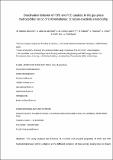Deactivation behavior of Pd/C and Pt/C catalysts in the gas-phase hydrodechlorination of chloromethanes : structure-reactivity relationship
Abstract
This study analyzes the influence of chemical and physical properties of Pd/C and Pt/C hydrodechlorination (HDC) catalysts in the different evolution of their activity during time on stream. Pt/C showed stable activity in the HDC of dichloromethane (DCM) and chloroform (TCM), while Pd/C was deactivated after 90 h of operation, particularly during HDC of DCM. The deactivation of Pd/C catalyst can be attributed to the lower proportion of zero-valent species and larger metal particle size. This appears to hinder the H2 dissociation, enhance the irreversible chemisorption of reactants and reaction products, and favor coupling reactions (leading to the formation of carbonaceous deposits) and/or metal phase change reactions. The more extensive deactivation of Pd/C in the HDC of DCM is attributed to the stronger chemisorption of the reactant on the catalyst, which leads to the formation of a new PdCx phase by the incorporation of carbon atoms into the metal lattice.
Citation
Martin-Martinez , M , Álvarez-Montero , A , Gómez-Sainero , L M , Baker , R T , Palomar , J , Omar , S , Eser , S & Rodriguez , J J 2015 , ' Deactivation behavior of Pd/C and Pt/C catalysts in the gas-phase hydrodechlorination of chloromethanes : structure-reactivity relationship ' , Applied Catalysis B: Environmental , vol. 162 , pp. 532-543 . https://doi.org/10.1016/j.apcatb.2014.07.017
Publication
Applied Catalysis B: Environmental
Status
Peer reviewed
ISSN
0926-3373Type
Journal article
Description
The authors acknowledge financial support from the Spanish Ministerio de Economía y Competitividad (MINECO) through the project CTM2011-28352. M. Martín Martínez acknowledges the Spanish Ministerio de Ciencia e Innovación (MICINN) and the European Social Fund (ESF) for her research grant.Collections
Items in the St Andrews Research Repository are protected by copyright, with all rights reserved, unless otherwise indicated.

